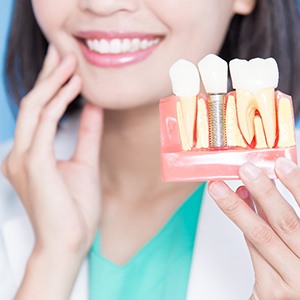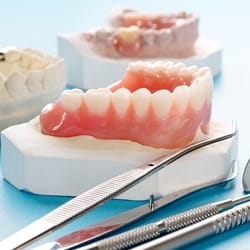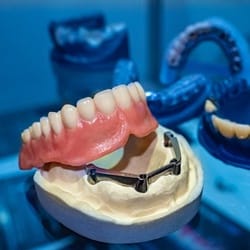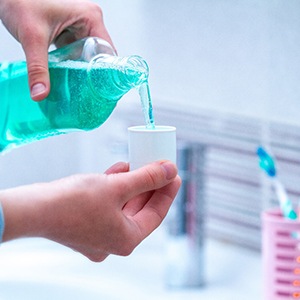Dentures - Fairfax, VA
Replacing Missing Teeth So You Can Eat and Speak With Ease Again

Missing several or all of your teeth has a drastic effect on your day-to-day life and can heavily impact your health. The American College of Prosthodontists approximates that about 40 million adults in the nation are missing all of their teeth, meaning you’re not alone. Fortunately, there are high-quality tooth-replacement solutions that can help you regain the function and look of your smile and preserve your wellbeing. At Fairfax Dental Group, we use natural-looking, high-quality materials to craft full and partial dentures in Fairfax, VA that are comfortable and beautiful. That way, you can eat and speak without having to struggle. To learn how our team of dental professionals can help replace your missing teeth in Fairfax, schedule a consultation by contacting our dental office today!
Who’s a Good Candidate for Dentures?

Should you suffer from tooth loss, you’re likely a good candidate for dentures in Fairfax. After all, these prosthetics work whether you lack a few teeth or many. That said, you’ll only know for sure by consulting with our dentists. They can assess if treatment is right for you or if preliminary work is needed. Fortunately, we at Fairfax Dental group are happy to explain that process. To learn more about it, just keep reading or contact us for the details.
Effects of Missing Teeth

Being without teeth is a serious situation. Not only are the causes of tooth loss dangerous, but the same applies to its long-term effects.
For starters, lost teeth result from one (or more) of various oral health issues. These can include tooth decay, gum disease, dental injury, etc. If you don't address your missing chompers, those problems will only worsen. You don’t want that, right?
Adding insult to injury, tooth loss has its own adverse side effects. Naturally, the most obvious ones are increased speaking, eating, and smiling difficulties. However, the condition will even erode your jaw if left unchecked. In that case, you might suffer from facial collapse – shrinkage of the jawbone that ages your face.
What Qualifies You for Dentures?

Again, you’ll probably qualify for dentures if you suffer tooth loss. At the same time, though, there are other signs you’d make a good candidate. These range from having dental sensitivity and advanced decay to sporting healthy gum and bone tissue. Plus, you’ll need a commitment to oral health and denture maintenance for treatment to work.
As for denture type, the number of lost teeth determines the best one for you. On the one hand, it might be a partial model that replaces a few pearly whites. Conversely, it could be a full type that replaces an entire arch. Your dentist will confirm things at your consultation visit.
Alternative Tooth-Replacement Options

Of course, there’s a chance you might not qualify for dentures. Still, don’t worry – it’s not the end of the world if that happens. Fairfax Dental Group offers several other tooth-replacement options. In particular, we provide the following:
- Dental Bridges: As a fixed restoration, a dental bridge replaces one or a few teeth. To that extent, it supports itself by clasping to a patient’s other pearly whites.
- Dental Implants: Dental implants are titanium posts inserted into your jawbone. They naturally fuse with your jaw over time, so patients who get them need a solid bone structure. Implant placement costs more than traditional dentures, but it’s permanent.
Learn More About Dental Bridges
Learn More About Dental Implants
How Dentures Are Made

While you may have decided that dentures are the ideal option for restoring your smile, you might be interested to know how they’re made. By understanding their construction process and the materials used to fabricate your personalized prosthetics, you may gain another level of appreciation for your new set of pearly whites. Read on to learn how dentures are made in Fairfax.
What Are Dentures Made Of?

These natural-looking prosthetics are generally comprised of two major components: the base and the artificial teeth. Here’s what each part is made of:
- Denture base – This is the structure that will support the prosthetic teeth. The base can be fabricated from a wide variety of materials, such as nylon, resin, and acrylic. In most cases, full dentures are created by using acrylic since it can be designed to closely mimic your natural gum line. Partial dentures might use metal clasps along with either an acrylic or nylon base.
- Artificial teeth – These are the replacement teeth connected to the denture base. While they appear natural, they’ll be constructed out of resin or porcelain. For many dentists, porcelain is a preferred option, as it’s incredibly durable and feels/looks just like normal pearly whites.
The Denture Creation Process

The process of fabricating dentures involves multiple steps. Firstly, your dentist will take impressions of both your upper and lower gum line by using a thick paste. This will allow us to create a plaster model that matches the shape and size of your mouth exactly, ensuring your dentures fit you perfectly.
We’ll send the plaster model to a dental lab for the fabrication portion. The technicians there will begin by developing a wax replica of your gums. Afterward, the prosthetic teeth will be placed with wax via a mechanical device called an articulator. They’ll then make any necessary adjustments.
Our team will receive the wax dentures so we can check their fit. Should they appear good, we’ll send them back to the lab for completion. The technician will boil the dentures by placing them in a flask, adding plaster to maintain their shape, and then moving the container to hot water so the wax component can melt away. Then, holes will be made in the teeth before injecting the flask with acrylic to replace the wax.
With special tools, the majority of the plaster will be strategically removed from the dentures before putting the prosthetics in an ultrasonic batch to get rid of the remaining particles. Any excess acrylic will be cut from the prosthetics and then the technician will polish the final product. Once the dentures are prepared, you’ll come back to our office for a fitting. We’ll make any minor adjustments to your new teeth and verify that you’re satisfied with the results before sending you on your way to enjoy your brand-new smile.
Adjusting to Your New Dentures

It’s normal to experience some mild discomfort after first receiving your dentures. This is because your mouth and gum tissues will need to grow accustomed to the new prosthetics. The good news is that this should only be temporary. With some time and practice, your dentures should feel increasingly natural. While you adjust to wearing them, try sticking to soft foods and exercising your facial muscles. If you notice any discomfort that persists for too long, be sure to notify us for help.
Full Dentures

When our patients come to us and are missing an entire arch or all of their teeth, we often recommend full dentures in Fairfax. These are customized replacement teeth that are typically made from ceramic or porcelain and secured to a gum-colored acrylic base. They’re completely removable, allowing patients to take them out before they go to bed in order to rest their mouth and gums. This feature makes them easier to clean and sanitize. Traditional dentures are also able to securely stay in your mouth using natural suction and denture adhesive, which allows you to comfortably and confidently let your smile show.
Partial Dentures

For our patients who are missing several teeth in an arch but not all of them, we’ll likely recommend removable partial dentures in Fairfax instead. These allow you to preserve your remaining natural teeth while still restoring the gaps in that arch. The replacement teeth are attached to a customized base that can be made of metal or gum-colored acrylic and is made to be discreet. The foundation secures your replacement teeth, restoring your ability to eat and speak with ease.
Dental Implant-Retained Dentures

Our patients who are looking for a longer-lasting denture that restores the entire structure of missing teeth, dental implants in Fairfax are a modern restorative procedure with a variety of unique benefits. They consist of titanium implant posts that are surgically placed below your gum to replace the missing roots of your tooth to prevent jawbone deterioration. Attached to these posts are custom-crafted dentures, which remain securely in place without the use of natural suction or adhesive.
Benefits of Dentures

When you don’t have all of your teeth, it can be difficult to complete daily tasks, like chewing, speaking, and smiling without feeling self-conscious. This is where dentures can help. Dentures are a life-changing tooth replacement option for people who are missing several, most of, or all of their teeth. If you have suffered from tooth loss, dentures can give your smile another chance! Here are some of the benefits you can expect to experience.
Psychological Benefits

People who don’t have teeth often struggle with accepting their tooth loss. This can have a lasting impact on one’s self-esteem and increase the risk of experiencing sadness and depression. By restoring the appearance and function of your smile with dentures, you are likely to experience a boost in confidence as well as reduce anxieties you have about appearance, speech articulation, chewing ability, and more!
Clearer Enunciation

Missing teeth can make it challenging to pronounce words properly. When you are unable to touch your tongue to your teeth some words become very difficult to say. Because dentures take the place of your missing teeth, you are able to enunciate more clearly while you talk. After a short adjustment period and some practice, speaking will come naturally.
Improves Nutrition

Lots of foods that are good for you are tough to chew. This includes certain veggies, fruits, and proteins. When you aren’t able to chew thoroughly, you can experience issues like tooth indigestion or malnutrition. By improving your ability to chew, dentures, allow for a more expansive diet of nutritious foods. This way, you can get the vitamins and minerals you need to stay healthy.
Preserves Oral Health

If you still have some of your natural teeth, getting dentures can help to keep them from shifting to other areas of the mouth. Dentures are also able to bear some of the weight of regular chewing, reducing the wear and tear of your existing teeth.
Expands Opportunity

When people first meet you, your smile is one of the first things that they notice. When it comes to your professional life, it is crucial that you make a great first impression, and having a complete, beautiful smile is certainly an advantage.
Maintenance Tips to Help Your Dentures Last Longer

Even though your dentures can’t develop cavities, it’s incredibly important to regularly clean and care for them. With routine maintenance, your replacement teeth can last anywhere from seven to 15 years. Here are some tips to help keep your dentures clean and avoid damaging them:
- Place a cloth on the bathroom counter to set your dentures down on while you’re cleaning them. This will prevent them from sliding off and potentially breaking or fracturing when they hit the ground.
- Clean your dentures using a denture toothbrush and denture cleaner every day.
- Store your dentures in a cup of room temperature water or denture-soaking solution every night to make sure they hold their shape.
- For partial dentures, it’s important to continue brushing and flossing your remaining natural teeth to keep them healthy.
If you have any questions or concerns involving replacing your missing teeth in Fairfax or caring for your dentures, don’t hesitate to contact our dental office today. Our team would be more than happy to help restore your smile with functional and beautiful full or partial dentures!
Understanding the Cost of Dentures

Dentures are highly personalized to your specific concerns and come in many varieties based on these needs. With this in mind, the best way to know for sure what your costs will look like when considering dentures is to give us a call to complete a detailed consultation. Our dentists at Fairfax Dental Group are happy to assess your oral health needs so you can receive the most natural-looking and longest-lasting denture possible.
Factors That Affect the Cost of Dentures

Every patient is different, so your dentures could cost significantly less or more than someone else. However, when determining the overall price tag for your new smile, there are some factors our team will take into consideration, including:
- Timeline of treatment
- Difficulty of the treatment
- Preparatory treatments (i.e. extractions)
- Materials used for the acrylic base
- Materials used for restorations (i.e. acrylic and porcelain)
- Number of dentures you will need (i.e. top, bottom, or both)
Keep in mind that choosing the cheapest denture possible is not the most ideal. After all, for an appliance that is going to be used regularly, it’s important to invest in what goes in your mouth.
Are Implant Dentures More Expensive?

If a denture is retained with dental implants, treatment is more expensive because of the additional steps necessary to complete treatment. However, this is for a good reason. Once the implants have fully integrated into the jaw, they are fully capable of not just holding a denture, but making it far more secure compared to a traditional full or partial denture. The denture is more permanent, lifelike, and longer-lasting, which means you can expect your new smile to last longer and provide more confidence when eating your favorite foods. For comparison, a denture usually needs to be replaced every five to seven years, while implant dentures can last for multiple decades.
Does Dental Insurance Cover Dentures?

Once you have an idea as to how much you can expect to pay for your dentures, you’ll need to review your dental insurance policy to determine how much, if any, they will cover for your treatment. Our team will be happy to assist in this process if you prefer. While most dental insurance plans offer some level of coverage for dentures, they are only likely to be covered. If your insurance plan does provide coverage, they generally have about 50% of their cost covered.
Other Options for Making Dentures Affordable

If you don’t currently use dental insurance or don’t have coverage for dentures, there are other methods available at our office that can help make your treatment more affordable. For example, CareCredit allows for flexible monthly installments on dental care, often with little to zero interest attached. Alternatively, our office provides a Wellness Plan which not only guarantees specific dental services at a flat rate, but provides a discount on all other services performed at Fairfax Dental Group (excluding Invisalign.)
Of course, you’re always encouraged to give our office a call directly to set up a consultation and learn more.
Dentures Aftercare

Even though your dentures can’t develop cavities, it’s incredibly important to regularly clean and care for them to prevent plaque and bacteria build-up. With routine maintenance, your replacement teeth can last anywhere from seven to 15 years, making them an excellent investment. Learn how to properly care for your new replacement teeth by clicking below.
Removable Dentures

Removable traditional dentures are those that utilize natural suction to stay securely in the mouth, allowing you to eat and speak with ease. Although these require more involved maintenance than implant dentures, they’re easy to clean and care for.
Remove & Rinse After Eating
After each time you eat, it’s important to remove your dentures and rinse them with lukewarm or room temperature water, never hot water. This will clear any lingering food debris from them and give you a chance to clean your gums as well, minimizing bacteria accumulation within the mouth that could lead to infection and keeping your prosthetics from smelling.
Clean Your Prosthetic Daily
In addition to rinsing your dentures after each time you eat, you’ll need to clean them ideally twice every day. Using a special denture cleaning toothbrush and cleanser, gently clear all plaque accumulation. Never use a non-soft-bristled brush or regular toothpaste, as this can cause them to become scratched or damaged. Additionally, be sure to place them on a towel instead of a slick countertop to keep them from falling and breaking.
Keep Your Dentures Safe
Dentures are crafted from acrylic and ceramic, meaning they can become cracked, damaged, and scratched if you’re not careful when cleaning them. Be sure to store them in a safe place, like a hard protective case for partials, and for full dentures, whenever they’re not in your mouth, place them in a glass of room temperature water in a safe area so no pets or children can get to them.
Remove When You Sleep
Never sleep with your dentures in your mouth, as this could increase the likelihood of developing oral sores and other issues. When you do, store them in a glass of room temperature water where they can’t get knocked over.
Notice Changes
The average lifespan of dentures is about seven years. Around this point, if you notice they begin to fit differently or have difficulty eating and speaking with them, it may be a sign that they need to be relined or replaced by your dentist.
All-on-4 Dentures

All-on-4 dentures are permanently attached within your mouth to four dental implants located in the densest, most supportive areas of your jawbone. Unlike removable dentures, these will function and look identical to your natural teeth, meaning care will be slightly different:
- Brush Them Twice a Day: Using a soft-bristled toothbrush and non-abrasive toothpaste, clean your teeth twice a day. This will remove plaque from the surface of your prosthetic and prevent it from turning into tartar.
- Rinse Your Mouth Daily: Rinse your mouth with a non-alcoholic mouthwash once a day.
- Visit Your Dentist Regularly: Every six months, visit your implant dentist in Fairfax for a checkup and cleaning.
Dentures FAQs

Unsure what to expect when having dentures put into place? At Fairfax Dental Group, we know you probably have a lot of questions surrounding your tooth replacement solution, which is why we’ve worked to compile a list of denture FAQs in Fairfax for you to review. Our team understands how this sudden change in your appearance can take time to adjust to. We also know you’ll need some guidance on how to care for your new smile and what you should and shouldn’t do to ensure its longevity. We invite you to review the following information and contact our office if you have any additional questions or concerns. We’ll be happy to schedule an appointment and go over the necessary details with you.
How long will it take to adjust to my new dentures?
When preparing to receive your new dentures, you can expect there to be an adjustment phase. After all, your tongue, cheeks, gums, and other oral structures will need to become accustomed to these new fixtures. Fortunately, this period of time shouldn’t last too long, and there are a few things you can do to make the process easier, such as:
- Slowly speaking in front of a mirror. Because you’ll likely have some difficulty forming certain words or speak with a slight lisp in the beginning, you may want to slow down your speech and practice enunciating certain words to minimize the difference in how you sound when you speak.
- Avoid eating hard, crunchy foods in the beginning. Instead, stick to softer foods, as this will prevent additional soreness in the beginning. It will also help you to become more adjusted to the denture being in your mouth while you eat. Over time, you can begin to incorporate regular, solid foods as you become more comfortable.
Can I sleep in my dentures?
It is strongly advised that you do not sleep in your dentures. Here’s why: It’s important that your prosthetics remain moist to prevent breakage. By soaking them at night, you will not only give your gums and jaw a break and chance to breathe, but you’ll also be taking better care of your dentures by allowing them to be thoroughly cleaned throughout the night. When you wake, make sure to rinse them off before reinserting them into your mouth.
What is the average cost of dentures?
Every patient is different, so your dentures could cost significantly less or more than someone else. However, when determining the overall price tag for your new smile, there are some factors our team will take into consideration, including:
- Location of the dental practice
- Timeline of treatment
- Difficulty of the treatment
- Number of dentures you will need (i.e. top, bottom, or both)
Once you have an idea as to how much you can expect to pay for your dentures, you’ll need to review your dental insurance policy to determine how much, if any, they will cover for your treatment. Our team will be happy to assist in this process if you prefer.
How Often Do I See My Dentist When Wearing Dentures?
Even if you have a full denture replacing an entire arch of teeth, you still need to see your dentist regularly for a checkup and cleaning. We must be able to examine your restoration to make sure no problems are occurring or issues developing with your denture(s). If you want them to remain in place as long as possible, you’ll want to make sure you’re keeping these appointments in addition to practicing good oral habits at home.
Will It Hurt to Get Dentures?
Usually, a denture treatment is painless. Dentists take steps to ensure everything goes smoothly and comfortably. That said, there are some things to keep in mind.
First, you’ll likely have aches if you get teeth pulled before denture work. It’s normal to feel discomfort after the oral surgery. As such, take your prescribed pain medication as directed. Any lingering pain should fade in 3-5 days.
Next, some soreness may occur when you first receive dentures. Your mouth will need time to adjust to the appliance. (The exact timing, though, varies by patient.) Still, call your dentist if the pain worsens or persists for a long time. Perhaps the dentures weren’t fitted properly, or you may have an oral problem.
Is It Hard to Talk with Dentures?
At first, it’s often hard to talk with dentures. You’ll need time to learn how to speak with them. Plus, the precise timeline varies from patient to patient. Even so, you’ll eventually get the hang of things.
All that said, you can speed up the adjustment with practice. One option is to talk out loud and re-teach yourself to enunciate well. Alternatively, you might use a denture adhesive. This material keeps your prosthetics secure when you speak.
Before you’ve mastered your dentures, you might lisp a bit. This impediment would stem from changes in your palate. However, the lisp will go away once you correct the changes.
Can You Kiss with Dentures?
As a matter of fact, yes – you can kiss with dentures. The prosthetic teeth won’t restrict you from smooches. Of course, you’ll need to adjust to how your new kisses would work.
You see, dentures don’t contain nerves like real teeth do. That means it’s harder to sense their position in your mouth. If you aren’t careful, you might kiss too hard or bump your dentures against your partner’s teeth.
Luckily, you can compensate for this change. Just focus on kissing gently when wearing dentures. That way, your prosthetic teeth won’t shift out of place.
Do Upper Dentures Always Cover the Palate?
In reality, upper dentures don’t always cover the palate. Some are designed to be “palate-less” and expose the roof of your mouth.
There’s a good reason “palate-less” dentures exist. When the roof of your mouth is covered, your ability to taste food is reduced. Therefore, dentists created some that lack a plate for your palate. These dentures won’t get in the way of tasting rich and flavorful meals.
If you’re considering palate-less dentures, talk to your dentist. They’ll tell you about the prosthetics they offer and their options for the upper arch.

